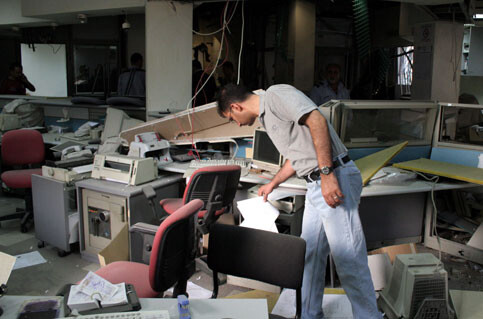Palestinian Center for Human Rights 20 September 2006

Palestinians inspect the damage at a money exchange shop in the West Bank city of Nablus after Israeli soldiers broke into the shop, September 20, 2006. (MaanImages/Rami Swidan)
In a new piracy crime perpetrated by a state army under orders from the highest levels of a state government, Israeli Occupation Forces (IOF) raided financial institutions in the cities of Ramallah, Nablus, Tulkarm, and Jenin. IOF raided the National Jordanian Bank in Nablus and 11 money exchanges in the four cities. The raiding forces confiscated the property of the raided sites, and detained 7 of their owners. In addition, IOF confiscated 6 million New Israeli Shekels (NIS) (approximately 1.336 million dollars) claiming that the confiscation was based on information that the money exchanges funnel cash to be used in operations against Israeli targets.
In Nablus, IOF raided the National Jordanian Bank and 3 money exchanges, confiscating money and arresting one money exchange owner. The raided exchanges belong to Husam Fakhri Abu Eleyan, Anwar Mustafa Eleyan, Amjad Mahmoud Hamad, Afif Mohammad Afif M’lietat, and Ghalib Hussein Sweidan. It is noted that Sweidan (40) was arrested from his home.
In Tulkarm, IOF raided 3 money exchanges and confiscated cash and financial documents. The exchanges belong to Kamal Abdel Halim Salim Theyab, Ibrahim Mustafa Ahmad Awad, and Mohammad Ahmad Awad. IOF detained the first two of these owners and the son of the third owner.
In Jenin, IOF raided 3 money exchanges and confiscated cash. The exchanges belong to Sa’id M’rar Abu M’rar, Mohammad Ibrahim Nassar, and Younis Helmi Younis El-Jarmi.
In Ramallah IOF raided El-Hawari and El-Ajouri money exchanges and confiscated cash. They detained Ghazi El-Ajour, the owner of one of the exchanges, and two of his sons.
It is noted that IOF conducted a similar raid on 25 February 2004 against the Arab Bank and Cairo-Amman Bank in Ramallah and El-Bireh, confiscating 40 million NIS (approximately 9 million dollars). The then defense minister Shaol Mofaz claimed that there was intelligence information indicating that the 390 bank accounts of Palestinian charitable organizations targeted in the raid were used to finance operations against Israel.
PCHR strongly condemns IOF piracy against financial institutions in the West Bank, and stresses that this raid is a form of collective punishment and economic sanctions imposed by IOF against Palestinians. The Centre points to the fact that Israel imposes restrictions and supervision on all financial transactions from abroad, refuting the claim made regarding the latest raid.
In the Center’s view, the complacency of the international community and the High Contracting Parties of the 4th Geneva Convention and their failure tot take effective steps to stop Israeli war crimes has been a supporting and encouraging element for Israel to continue perpetrating additional war crimes against Palestinian civilians. The Centre reminds the High Contracting Parties of:
The Palestinian Centre for Human Rights (PCHR) is an independent legal body based in Gaza City dedicated to protecting human rights, promoting the rule of law and upholding democratic principles in the Occupied Palestinian Territory. It holds Special Consultative Status with the Economic and Social Council (ECOSOC) of the United Nations and is an affiliate of the International Commission of Jurists, the F d ration Internationale des Ligues des Droits de l’Homme (FIDH), and the Euro-Mediterranean Human Rights Network. PCHR is a recipient of the 1996 French Republic Award for Human Rights.